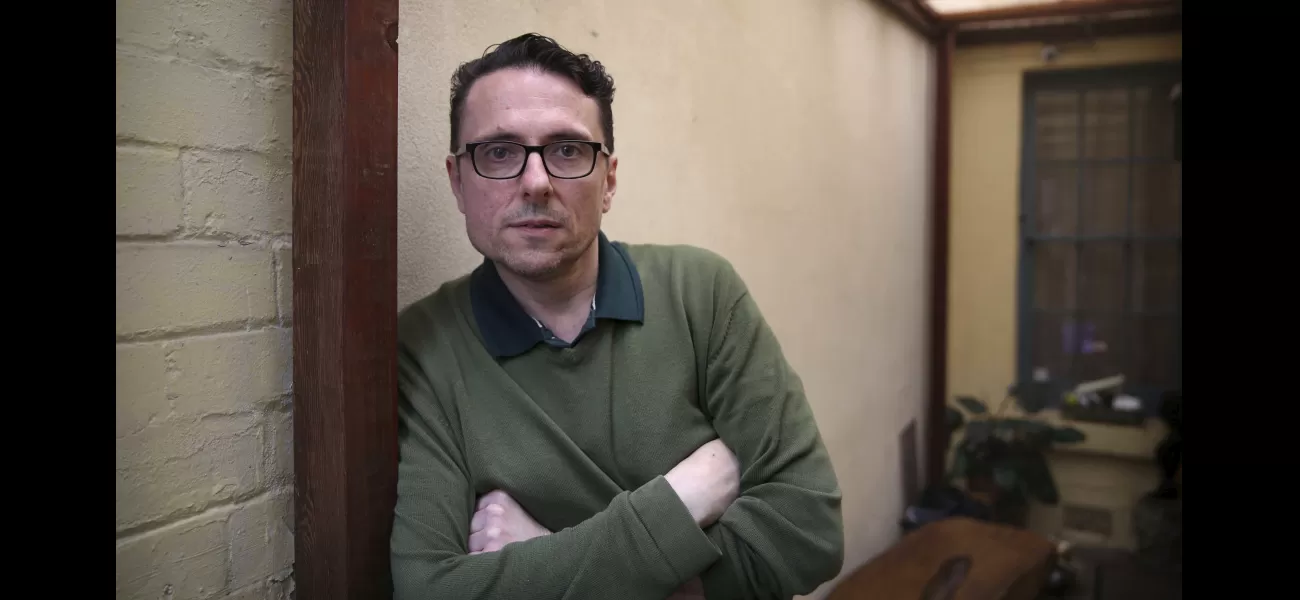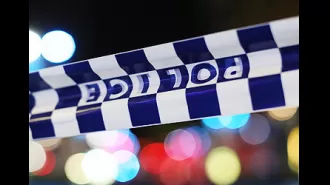Teen Charles received contaminated blood from a heroin user.
Australian victims are urging action after damning UK findings.
May 22nd 2024.

During his teenage years in the 1980s, Charles MacKenzie, a schoolboy from Sydney, was being treated for a rare blood disorder. As part of his treatment, he received donated blood from an unknown source. Little did he and his family know, the blood came from an ex-prisoner with a history of drug use, including heroin, speed, and cocaine.
Now in his 50s, MacKenzie is one of the many Australians who were infected with hepatitis C through contaminated blood donations. Others were also infected with the HIV virus, and many of these victims were individuals with haemophilia, a blood clotting disorder that required regular blood transfusions.
For decades, MacKenzie has been fighting for justice for himself and the thousands of other Australians who were affected by the tainted blood donations that occurred between the 1970s and early 1990s. As the head of the advocacy group Infected Blood Australia, he has been tirelessly working to bring attention to this issue and to seek recognition and compensation for the victims.
Recently, a significant inquiry into infected blood donations in the UK was released, giving MacKenzie and the remaining Australian victims hope for justice. The four-year investigation uncovered shocking truths about how the British public health service knowingly exposed thousands of patients to deadly infections and concealed the disaster for decades.
In response to the inquiry's findings, British Prime Minister Rishi Sunak issued an apology to the victims, stating that the report should shake the nation to its core. MacKenzie believes that this inquiry has brought to light a scandal that has been buried for far too long and that Australia needs to take similar action.
According to MacKenzie, a royal commission should be held in Australia to address the country's blood tainting scandal, which closely mirrors what happened in the UK. He claims that Australia was the worst in the world when it came to contaminated blood donations.
Despite his public efforts to bring attention to this issue, MacKenzie only shared his personal story for the first time when he testified at the UK inquiry in 2020. He explained that he was compelled to speak out because it felt like this was their last chance to seek justice.
MacKenzie also revealed that he learned about his blood donor's history through his lawyer, who obtained documents in 1997. These documents included a transcript of a "lookback" interview conducted by the Australian Red Cross Blood Service, which revealed the donor's hepatitis C diagnosis and his history of drug use and sharing needles between 1974 and 1985. The donor also had a criminal record and had been involved with a prostitute.
MacKenzie was shocked to discover that the Australian Red Cross Blood Service did not immediately contact all the individuals who had received tainted blood from this donor. He believes that this failure to inform the recipients, including himself, is what led to the spread of infection and ultimately, the deaths of some victims.
Through his advocacy efforts, MacKenzie's work led to a Senate inquiry in 2004, which investigated the impact of hepatitis C on Australia's blood supply. During the inquiry, the Australian Red Cross Blood Service estimated that between 3,500 and 8,000 Australians were living with hepatitis C contracted through blood transfusions, with about 1,350 being individuals with haemophilia.
MacKenzie has seen firsthand the devastating effects of infected blood donations, with people losing their lives and families being torn apart. He has witnessed individuals lose their homes and businesses, and their lives changed forever because of these tainted treatments. Despite his own health struggles, MacKenzie remains determined to continue fighting for justice for the victims and their families.
Growing up in Sydney during the 1980s, Charles MacKenzie was just like any other schoolboy. However, his life took an unexpected turn when he was diagnosed with a rare blood disorder. As part of his treatment, he received donated blood from an unknown source. Little did he know, that blood came from an ex-prisoner who had a history of drug use including heroin, speed, and cocaine.
Years went by and MacKenzie, now in his 50s, found himself as one of the many Australians infected with hepatitis C through tainted blood donations. Others were also infected with the HIV virus. Most of the victims were people with haemophilia, a blood clotting disorder, who relied on regular blood transfusions.
The recent release of a damning report on infected blood donations in the UK has given MacKenzie and other surviving Australian victims a glimmer of hope. For decades, MacKenzie has been tirelessly advocating for justice for those who were affected by tainted blood donations between the 1970s and early 1990s. Now, with the findings of the inquiry, there is a possibility of recognition and compensation for the victims in Australia.
The four-year British inquiry uncovered the shocking truth that the country's public health service knowingly exposed tens of thousands of patients to deadly infections through diseased blood and blood products. What's even more disturbing is that they hid this information for decades. In a public apology to the victims, British PM Rishi Sunak stated that the inquiry's final report should shake the nation to its core.
For MacKenzie, this revelation only reaffirms the urgent need for a royal commission in Australia to investigate their own blood tainting scandal, which is strikingly similar to what happened in the UK. He believes that this scandal is one of the biggest to be buried for many years and that Australia is, unfortunately, the worst in the world when it comes to tainted blood.
Despite being a prominent figure in advocating for Australian tainted blood victims, MacKenzie only shared his personal story for the first time when he testified at the UK inquiry in 2020. He confessed that he was moved to speak out because he saw it as their last chance to seek justice. As an ill man, he wanted to make sure he did everything he could before his time ran out.
MacKenzie's own experience with tainted blood came to light when his lawyer obtained documents through the discovery process back in 1997. These documents included a transcript of an interview, known as a "lookback," conducted by the Australian Red Cross Blood Service with the donor of the blood he received. It was revealed that the donor had hepatitis C, used intravenous drugs, and had a history of sharing needles between 1974 and 1985. The donor also spent time in prison and had a prostitute as one of his previous sexual partners.
Despite this knowledge, the Australian Red Cross Blood Service failed to contact any of the man's previous recipients, including MacKenzie. This negligence has resulted in many unnecessary deaths and families being torn apart due to infected blood donations. According to MacKenzie, some victims have lost their homes and businesses due to the devastating effects of hepatitis C and HIV.
MacKenzie's passionate advocacy efforts led to a Senate inquiry being held in 2004 to investigate "Hepatitis C and the blood supply in Australia." During the inquiry, it was estimated that between 3500 to 8000 Australians were living with hepatitis C as a result of tainted blood transfusions, with around 1350 of those being haemophiliacs.
Now in his 50s, MacKenzie is one of the many Australians who were infected with hepatitis C through contaminated blood donations. Others were also infected with the HIV virus, and many of these victims were individuals with haemophilia, a blood clotting disorder that required regular blood transfusions.
For decades, MacKenzie has been fighting for justice for himself and the thousands of other Australians who were affected by the tainted blood donations that occurred between the 1970s and early 1990s. As the head of the advocacy group Infected Blood Australia, he has been tirelessly working to bring attention to this issue and to seek recognition and compensation for the victims.
Recently, a significant inquiry into infected blood donations in the UK was released, giving MacKenzie and the remaining Australian victims hope for justice. The four-year investigation uncovered shocking truths about how the British public health service knowingly exposed thousands of patients to deadly infections and concealed the disaster for decades.
In response to the inquiry's findings, British Prime Minister Rishi Sunak issued an apology to the victims, stating that the report should shake the nation to its core. MacKenzie believes that this inquiry has brought to light a scandal that has been buried for far too long and that Australia needs to take similar action.
According to MacKenzie, a royal commission should be held in Australia to address the country's blood tainting scandal, which closely mirrors what happened in the UK. He claims that Australia was the worst in the world when it came to contaminated blood donations.
Despite his public efforts to bring attention to this issue, MacKenzie only shared his personal story for the first time when he testified at the UK inquiry in 2020. He explained that he was compelled to speak out because it felt like this was their last chance to seek justice.
MacKenzie also revealed that he learned about his blood donor's history through his lawyer, who obtained documents in 1997. These documents included a transcript of a "lookback" interview conducted by the Australian Red Cross Blood Service, which revealed the donor's hepatitis C diagnosis and his history of drug use and sharing needles between 1974 and 1985. The donor also had a criminal record and had been involved with a prostitute.
MacKenzie was shocked to discover that the Australian Red Cross Blood Service did not immediately contact all the individuals who had received tainted blood from this donor. He believes that this failure to inform the recipients, including himself, is what led to the spread of infection and ultimately, the deaths of some victims.
Through his advocacy efforts, MacKenzie's work led to a Senate inquiry in 2004, which investigated the impact of hepatitis C on Australia's blood supply. During the inquiry, the Australian Red Cross Blood Service estimated that between 3,500 and 8,000 Australians were living with hepatitis C contracted through blood transfusions, with about 1,350 being individuals with haemophilia.
MacKenzie has seen firsthand the devastating effects of infected blood donations, with people losing their lives and families being torn apart. He has witnessed individuals lose their homes and businesses, and their lives changed forever because of these tainted treatments. Despite his own health struggles, MacKenzie remains determined to continue fighting for justice for the victims and their families.
Growing up in Sydney during the 1980s, Charles MacKenzie was just like any other schoolboy. However, his life took an unexpected turn when he was diagnosed with a rare blood disorder. As part of his treatment, he received donated blood from an unknown source. Little did he know, that blood came from an ex-prisoner who had a history of drug use including heroin, speed, and cocaine.
Years went by and MacKenzie, now in his 50s, found himself as one of the many Australians infected with hepatitis C through tainted blood donations. Others were also infected with the HIV virus. Most of the victims were people with haemophilia, a blood clotting disorder, who relied on regular blood transfusions.
The recent release of a damning report on infected blood donations in the UK has given MacKenzie and other surviving Australian victims a glimmer of hope. For decades, MacKenzie has been tirelessly advocating for justice for those who were affected by tainted blood donations between the 1970s and early 1990s. Now, with the findings of the inquiry, there is a possibility of recognition and compensation for the victims in Australia.
The four-year British inquiry uncovered the shocking truth that the country's public health service knowingly exposed tens of thousands of patients to deadly infections through diseased blood and blood products. What's even more disturbing is that they hid this information for decades. In a public apology to the victims, British PM Rishi Sunak stated that the inquiry's final report should shake the nation to its core.
For MacKenzie, this revelation only reaffirms the urgent need for a royal commission in Australia to investigate their own blood tainting scandal, which is strikingly similar to what happened in the UK. He believes that this scandal is one of the biggest to be buried for many years and that Australia is, unfortunately, the worst in the world when it comes to tainted blood.
Despite being a prominent figure in advocating for Australian tainted blood victims, MacKenzie only shared his personal story for the first time when he testified at the UK inquiry in 2020. He confessed that he was moved to speak out because he saw it as their last chance to seek justice. As an ill man, he wanted to make sure he did everything he could before his time ran out.
MacKenzie's own experience with tainted blood came to light when his lawyer obtained documents through the discovery process back in 1997. These documents included a transcript of an interview, known as a "lookback," conducted by the Australian Red Cross Blood Service with the donor of the blood he received. It was revealed that the donor had hepatitis C, used intravenous drugs, and had a history of sharing needles between 1974 and 1985. The donor also spent time in prison and had a prostitute as one of his previous sexual partners.
Despite this knowledge, the Australian Red Cross Blood Service failed to contact any of the man's previous recipients, including MacKenzie. This negligence has resulted in many unnecessary deaths and families being torn apart due to infected blood donations. According to MacKenzie, some victims have lost their homes and businesses due to the devastating effects of hepatitis C and HIV.
MacKenzie's passionate advocacy efforts led to a Senate inquiry being held in 2004 to investigate "Hepatitis C and the blood supply in Australia." During the inquiry, it was estimated that between 3500 to 8000 Australians were living with hepatitis C as a result of tainted blood transfusions, with around 1350 of those being haemophiliacs.
[This article has been trending online recently and has been generated with AI. Your feed is customized.]
[Generative AI is experimental.]
0
0
Submit Comment





